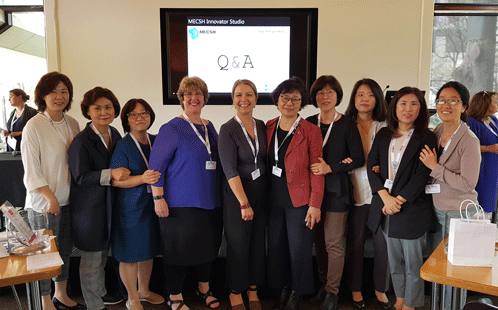From Western Sydney to South Korea: maternal health program to be rolled out internationally

Caption: Professor Lynn Kemp and Tracey Bruce (MECSH Implementation Consultant) with the Korean Delegates.
A Western Sydney University-led world first program designed for families at risk of poor maternal and child health and development outcomes in south west Sydney, is being expanded to all districts in Seoul South Korea, with the future ambition of rolling out across South Korea.
The Maternal Early Childhood Sustained Home‐visiting (MECSH) program involves structured ongoing home visits from a nurse (at least 25 visits over two years) for families with children up to the age of two. In addition to the ongoing nurse home-visits, The MECSH program also incorporates group activities for MECSH families and the engagement with and referral to health services and supports.
Instigator of the program and international leader in the field of early childhood interventions Professor Lynn Kemp from the School of Nursing and Midwifery says the international rollout of the program is testament to its success.
“One of the main reasons for the program’s success is its framing within the principal of ‘parenting effectively despite’. This means that we focus on a child’s health and development, and building the capacity of the parents. Unlike other health programs, we do not try to quick fix these ‘despites’ – which can be anything from homelessness to drug addition to postnatal depression. There is no judgement in this program, we keep our focus on a child’s health, development and optimal family support,” says Professor Kemp.
The program draws together the best available evidence on the importance of a child’s early years, children’s health and development, the types of support parents need and parent‐infant interaction. Outcomes of the program, which began as a small-scale program in the Miller/Green Valley area of south west Sydney in 2002, have included: more confident new mothers; children with lower rates of respiratory infection and improved cognitive development; and a more supportive home environment.
On learning of such outcomes, the South Korean Health Department reached out to Professor Kemp in 2014. At first to introduce the program to three districts in Seoul, and then, on the back of this success, to roll out the program across the whole of Seoul, and eventually the country.
Significantly, the rollout of the program in Seoul was instrumental in the establishment of a universal child and family health service system, serving the city’s 10 million residents. Previously families had no access to such support.
Professor Kemp says she is delighted to see the MECSH program benefiting so many.
“To see this project being rolled out across Seoul and potentially all of South Korea is just fantastic. Not only because it reiterates the strength of the program, but also because it is making such a huge impact and supporting families in establishing the foundations of a positive life trajectory for their children,” says Professor Kemp.
ENDS
22 March 2019
Mobile options:

